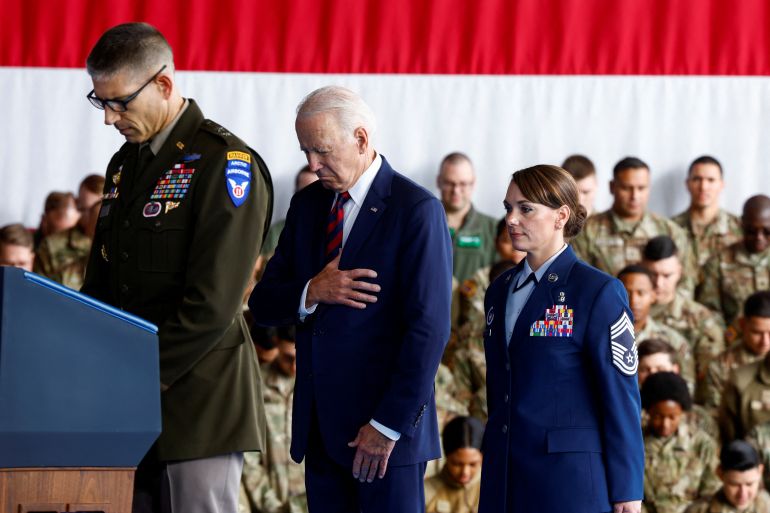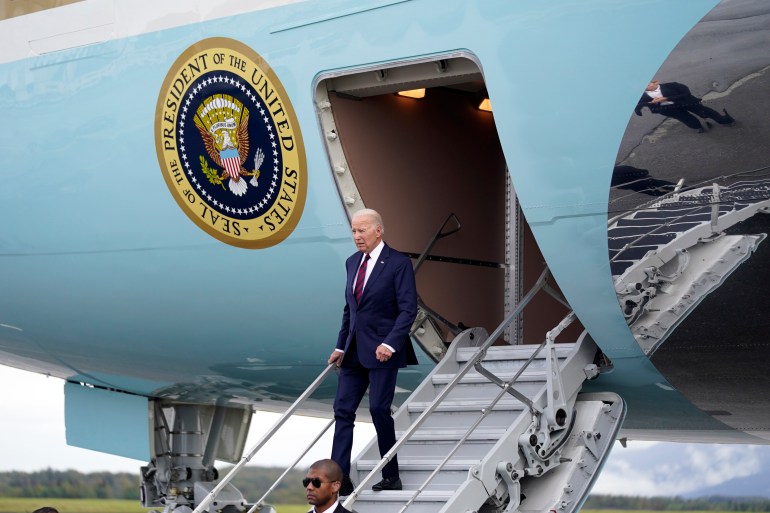Biden denounces ‘rising tide’ of ‘extremism’ in 9/11 anniversary speech
The Democratic president, angling for reelection in 2024, called for unity ‘regardless of our political backgrounds’.

United States President Joe Biden has issued a call for unity above politics as he commemorated the 22nd anniversary of the attacks on September 11, 2001.
Speaking from a military base in Anchorage, Alaska, the Democratic president denounced what he called a “rising tide of hatred and extremism and political violence” at home and abroad.
Keep reading
list of 3 itemsUS settles lawsuit alleging abuse of men detained after 9/11
US judge says 9/11 victims not entitled to Afghan bank assets
“Today, we can look across the country and around the world and see anger and fear in places many of you have been stationed before,” Biden said, speaking to an audience of military service members.
“It’s more important than ever that we come together around the principle of American democracy, regardless of our political backgrounds,” the president continued. “We must not succumb to the poisonous politics of difference and division. We must never allow ourselves to be pulled apart by petty, manufactured grievances. We must continue to stand united.”
Nearly 3,000 people died in the September 11 attacks, which saw hijacked planes crash into the Pentagon building in Virginia and the World Trade Center towers in New York. Passengers forced a fourth hijacked plane to crash into a field in Shanksville, Pennsylvania, after they learned of the attackers’ plans.
“Ground zero, New York — I remember standing there the next day and looking at the building,” Biden said. “I felt like I was looking through the gates of hell, it looked so devastated.”

Increase in ‘domestic terrorism’
Biden’s remarks come as a tense race for the 2024 presidential election begins to heat up — and as the US struggles with the increasing threat of “domestic terrorism”, defined by the government as life-threatening criminal acts committed with the intent to influence public policy.
The US Government Accountability Office (GAO) reported earlier this year that incidents of “domestic terrorism” had jumped by approximately 357 percent between 2013 and 2021, with the Federal Bureau of Investigation contending with 9,049 open cases by the end of that period.
The most violent of those cases, the GAO said, had to do with “racially- or ethnically-motivated violent extremists”.
Just last month, on August 26, a 21-year-old suspect — believed to be driven by white supremacy — killed three people in a predominantly Black neighbourhood of Jacksonville, Florida, before shooting himself.
The country also continues to grapple with the fallout from the attack on the US Capitol on January 6, 2021, when supporters of then-President Donald Trump attempted to interfere with the certification of the 2020 election.
Biden, who won that race, appealed to audience members on Monday to defend the country’s democracy.
“For all our flaws and disagreements, there is nothing we cannot accomplish when we defend with our hearts what makes us unique in the world: our democracy,” he said. “Every generation has to fight to preserve it.”
Visits to the G20, Vietnam
Biden’s stop in Anchorage came as the president travelled back to Washington, DC, after a whirlwind trip through Asia.
On Saturday, he concluded a trip to the Group of 20 (G20) summit in New Delhi, India, before being whisked away to Vietnam for a visit with the country’s leadership.
At both stops, Biden made a bid to strengthen the US’s international partnerships in an effort to create what critics interpret as a bulwark against Russian and Chinese ambitions.
Biden referenced his travels in Monday’s speech, framing them as key measures to ensuring US security.
“These trips are an essential part of how we are going to ensure the United States is flanked by the broadest array of allies and partners who will stand with us and deter any threat to our security, to build a world that is safer for all of our children — something that, today of all days, we’re reminded is not a given,” he said.
Biden also briefly acknowledged another foreign-policy milestone during his tenure as president: the withdrawal of US troops from Afghanistan.
While Biden has defended the withdrawal as the “best decision” for the US people, he has faced harsh criticism for its execution and aftermath: The Taliban quickly took control of Afghanistan, overthrowing the US-backed government and leaving many Afghans with US ties vulnerable to reprisals.
“Our longest war is over,” Biden said, referring to the war in Afghanistan. “But our commitment to preventing another attack on the United States and our people and our allies will never never rest.”
On the campaign trail
Biden is currently campaigning for reelection in 2024 and is considered the presumptive Democratic nominee.
But other candidates — most of whom are part of a crowded field of Republican hopefuls — likewise paid tribute to the events of September 11, a defining moment in US politics.
Current presidential candidate and former Vice President Mike Pence joined the Ankeny Fire Department in the critical primary state of Iowa for a remembrance ceremony. Florida Governor Ron DeSantis, meanwhile, joined mourners at the ground zero site in New York City, where the fallen World Trade Center towers once stood.
In a press release afterwards, DeSantis pushed the Biden administration to declassify intelligence documents about the September 11 attacks and pursue the “maximum lawful punishment” for those involved.
“Decades later, we as a nation still owe full transparency and accountability to these grieving families. Yet, too many politicians have broken past promises to them and that is wholly unacceptable,” DeSantis said.
It has long been taboo in US politics to campaign during the September 11 remembrances, but the attacks have formed a central part of many politicians’ campaign messaging over the last 22 years.
In 2015, for instance, current Republican frontrunner Donald Trump held rallies where he made false statements about people in New Jersey “celebrating as the World Trade Center was coming down” — something critics said was designed to stoke anti-Muslim hate. Trump was elected president the following year.
A tribute to John McCain
Biden did not mention Trump in Monday’s speech but evoked one of Trump’s Republican rivals, the late Senator John McCain, as an example of civility in times of divisiveness.
“John and I disagreed like hell. Like two brothers, we’d argue like hell on the Senate floor and then we’d go to lunch together,” Biden said.
Calling McCain a “war hero” and a “friend”, Biden urged Americans to follow in the late senator’s example. Trump had previously denied that McCain, a Vietnam War veteran, was a war hero.
“One thing I always admired about John was how he put duty to country first,” Biden said. “Above party, above politics, above his own person. This day reminds us: We must never lose that sense of national unity. So let that be the common cause of our time. Let us honour September 11 by renewing our faith in one another.”